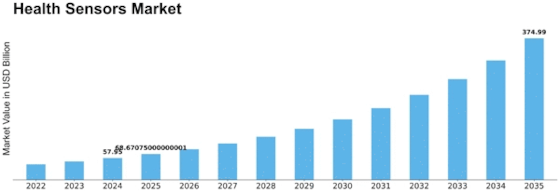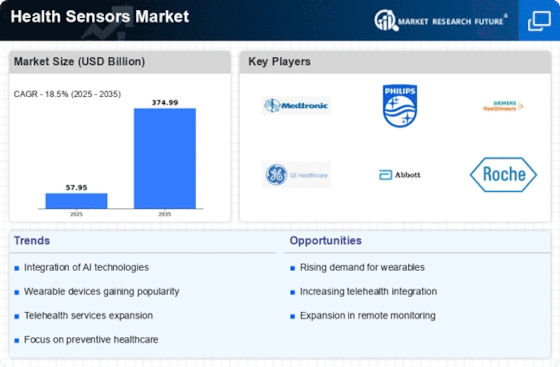Chronic Illness & At Risk-Monitoring
Wellness Monitoring
Patient Admission Triage
Logistical Tracking
In Hospital Clinical Monitoring
Sensor Therapeutics
Post-Acute Care Monitoring
Hand Held Diagnostic Sensors
Wearable Sensors
Implantable/Ingestible Sensors
Health sensors by ApplicationChronic Illness & At Risk-Monitoring
Wellness Monitoring
Patient Admission Triage
Logistical Tracking
In Hospital Clinical Monitoring
Sensor Therapeutics
Post-Acute Care Monitoring
Health sensors by ProductHand Held Diagnostic Sensors
Wearable Sensors
Implantable/Ingestible Sensors
Health sensors by ApplicationChronic Illness & At Risk-Monitoring
Wellness Monitoring
Patient Admission Triage
Logistical Tracking
In Hospital Clinical Monitoring
Sensor Therapeutics
Post-Acute Care Monitoring
Health sensors by ProductHand Held Diagnostic Sensors
Wearable Sensors
Implantable/Ingestible Sensors
Health sensors by ApplicationChronic Illness & At Risk-Monitoring
Wellness Monitoring
Patient Admission Triage
Logistical Tracking
In Hospital Clinical Monitoring
Sensor Therapeutics
Post-Acute Care Monitoring
Health sensors by ProductHand Held Diagnostic Sensors
Wearable Sensors
Implantable/Ingestible Sensors
Health sensors by ApplicationChronic Illness & At Risk-Monitoring
Wellness Monitoring
Patient Admission Triage
Logistical Tracking
In Hospital Clinical Monitoring
Sensor Therapeutics
Post-Acute Care Monitoring
Health sensors by ProductHand Held Diagnostic Sensors
Wearable Sensors
Implantable/Ingestible Sensors
Germany Outlook (USD Billion, 2018-2032)
Health sensors by ApplicationChronic Illness & At Risk-Monitoring
Wellness Monitoring
Patient Admission Triage
Logistical Tracking
In Hospital Clinical Monitoring
Sensor Therapeutics
Post-Acute Care Monitoring
Health sensors by ProductHand Held Diagnostic Sensors
Wearable Sensors
Implantable/Ingestible Sensors
Health sensors by ApplicationChronic Illness & At Risk-Monitoring
Wellness Monitoring
Patient Admission Triage
Logistical Tracking
In Hospital Clinical Monitoring
Sensor Therapeutics
Post-Acute Care Monitoring
Health sensors by ProductHand Held Diagnostic Sensors
Wearable Sensors
Implantable/Ingestible Sensors
Health sensors by ApplicationChronic Illness & At Risk-Monitoring
Wellness Monitoring
Patient Admission Triage
Logistical Tracking
In Hospital Clinical Monitoring
Sensor Therapeutics
Post-Acute Care Monitoring
Health sensors by ProductHand Held Diagnostic Sensors
Wearable Sensors
Implantable/Ingestible Sensors
Health sensors by ApplicationChronic Illness & At Risk-Monitoring
Wellness Monitoring
Patient Admission Triage
Logistical Tracking
In Hospital Clinical Monitoring
Sensor Therapeutics
Post-Acute Care Monitoring
Health sensors by ProductHand Held Diagnostic Sensors
Wearable Sensors
Implantable/Ingestible Sensors
Health sensors by ApplicationChronic Illness & At Risk-Monitoring
Wellness Monitoring
Patient Admission Triage
Logistical Tracking
In Hospital Clinical Monitoring
Sensor Therapeutics
Post-Acute Care Monitoring
Health sensors by ProductHand Held Diagnostic Sensors
Wearable Sensors
Implantable/Ingestible Sensors
Health sensors by ApplicationChronic Illness & At Risk-Monitoring
Wellness Monitoring
Patient Admission Triage
Logistical Tracking
In Hospital Clinical Monitoring
Sensor Therapeutics
Post-Acute Care Monitoring
Health sensors by ProductHand Held Diagnostic Sensors
Wearable Sensors
Implantable/Ingestible Sensors
Health sensors by ApplicationChronic Illness & At Risk-Monitoring
Wellness Monitoring
Patient Admission Triage
Logistical Tracking
In Hospital Clinical Monitoring
Sensor Therapeutics
Post-Acute Care Monitoring
Health sensors by ProductHand Held Diagnostic Sensors
Wearable Sensors
Implantable/Ingestible Sensors
Health sensors by ApplicationChronic Illness & At Risk-Monitoring
Wellness Monitoring
Patient Admission Triage
Logistical Tracking
In Hospital Clinical Monitoring
Sensor Therapeutics
Post-Acute Care Monitoring
Health sensors by ProductHand Held Diagnostic Sensors
Wearable Sensors
Implantable/Ingestible Sensors
Health sensors by ApplicationChronic Illness & At Risk-Monitoring
Wellness Monitoring
Patient Admission Triage
Logistical Tracking
In Hospital Clinical Monitoring
Sensor Therapeutics
Post-Acute Care Monitoring
Health sensors by ProductHand Held Diagnostic Sensors
Wearable Sensors
Implantable/Ingestible Sensors
Health sensors by ApplicationChronic Illness & At Risk-Monitoring
Wellness Monitoring
Patient Admission Triage
Logistical Tracking
In Hospital Clinical Monitoring
Sensor Therapeutics
Post-Acute Care Monitoring
Health sensors by ProductHand Held Diagnostic Sensors
Wearable Sensors
Implantable/Ingestible Sensors
Health sensors by ApplicationChronic Illness & At Risk-Monitoring
Wellness Monitoring
Patient Admission Triage
Logistical Tracking
In Hospital Clinical Monitoring
Sensor Therapeutics
Post-Acute Care Monitoring
Health sensors by ProductHand Held Diagnostic Sensors
Wearable Sensors
Implantable/Ingestible Sensors
Health sensors by ApplicationChronic Illness & At Risk-Monitoring
Wellness Monitoring
Patient Admission Triage
Logistical Tracking
In Hospital Clinical Monitoring
Sensor Therapeutics
Post-Acute Care Monitoring
Health sensors by ProductHand Held Diagnostic Sensors
Wearable Sensors
Implantable/Ingestible Sensors
Health sensors by ApplicationChronic Illness & At Risk-Monitoring
Wellness Monitoring
Patient Admission Triage
Logistical Tracking
In Hospital Clinical Monitoring
Sensor Therapeutics
Post-Acute Care Monitoring
Health sensors by ProductHand Held Diagnostic Sensors
Wearable Sensors
Implantable/Ingestible Sensors
Health sensors by ApplicationChronic Illness & At Risk-Monitoring
Wellness Monitoring
Patient Admission Triage
Logistical Tracking
In Hospital Clinical Monitoring
Sensor Therapeutics
Post-Acute Care Monitoring
Health sensors by ProductHand Held Diagnostic Sensors
Wearable Sensors
Implantable/Ingestible Sensors
Health sensors by ApplicationChronic Illness & At Risk-Monitoring
Wellness Monitoring
Patient Admission Triage
Logistical Tracking
In Hospital Clinical Monitoring
Sensor Therapeutics
Post-Acute Care Monitoring
Health sensors by ProductHand Held Diagnostic Sensors
Wearable Sensors
Implantable/Ingestible Sensors
Health sensors by ApplicationChronic Illness & At Risk-Monitoring
Wellness Monitoring
Patient Admission Triage
Logistical Tracking
In Hospital Clinical Monitoring
Sensor Therapeutics
Post-Acute Care Monitoring
Health sensors by ProductHand Held Diagnostic Sensors
Wearable Sensors
Implantable/Ingestible Sensors



















Leave a Comment